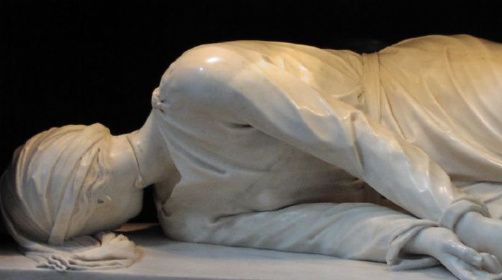
Posted on 05/16/2010 2:51:13 AM PDT by markomalley

While in Portugal this past week Pope Benedict XVI talked about Christian witness, and faithfulness, within a secularist world: “Seek dialogue, but be ready for martyrdom.”
The pontiff’s remarks on the need for Christians to be ready for “the radical choice of martyrdom” were a tidy lead-in to today’s New Testament reading:
They threw him out of the city, and began to stone him. The witnesses laid down their cloaks at the feet of a young man named Saul. As they were stoning Stephen, he called out, “Lord Jesus, receive my spirit.” Then he fell to his knees and cried out in a loud voice, “Lord, do not hold this sin against them;” and when he said this, he fell asleep.
Deacon Greg Kandra has posted a good homily that talks about Stephen, and Deacons and martyrs, reminding us that “Martyrs made our faith.”:
One of the most common is that permanent deacons are here because of the shortage of priests that started in the ’70s. The real genesis came much earlier, during World War II, in the German concentration camp at Dachau.
During the Third Reich over 2,000 Catholic priests were held at Dachau. One out of every 25 deaths there, in fact, was a priest.
The priest prisoners were kept in cellblock 26, known as “Der Priesterblock.” For the imprisoned priests, this experience was transformative. While in Der Priesterblock, many of them began talking about how to renew the Church when the war was over. How could the Church better serve the world? One answer, they felt, would include bringing back an ancient order of service, the diaconate.
After the camp was liberated, the priests who survived returned to a Europe in ruins – a world desperately in need of evangelization, just as in the first century. Some of the priests formed what they called Deacon Circles of clergy and laity – circles of prayer, and service and charity. By the early 1960s, some of those priests from Dachau had become bishops. They attended the Second Vatican Council. And the rest, of course, is history.
And so it was that the modern diaconate took root and grew – from seeds watered with the blood of martyrs of the 20th century, the martyrs of Dachau.
Greg also relates the story of how the permanent diaconate within the church grew behind the wholly secularized Iron Curtain, in Hungary, where committed men risked everything to prepare in secret for their ordinations, in order to put themselves at the service of others. These Hungarians joyfully dancing at Easter had to hang on to their faith through systemic secularist oppression.
So, the burgeoning theme is martrydom. What man has done, man can do; what Christians have endured before, still endure today in some parts of the world, and may yet have to embrace once more within the West, where secularists have ratcheted up their rants against everything but Islam.
A few years ago, pondering the forced conversions to Islam of two kidnapped journalists, I wrote:
This is an enemy thoroughly appreciative of the power of martyrdom, its ability to inspire, to convince and even to claim victory. We seem to have forgotten that martyrdom – a foolish waste, to Reason’s sensibility – is often the key componant toward changing social perceptions and even morals. The virgin martyrs, much derided in our “enlightened” era, were the first women to declare themselves set apart, meant to be more than chattel, able to declare themselves as belonging to no man or house, to “no one but Christ.” An unheard of concept!
…
Martyrdom is not about justice – it is not about reasonable death. It is about exactly the opposite; it is about facing down what is completely unreasonable and unjust and offering oneself to the cause of what is just – is reasonable. And yes, there is victory in it. But belonging, as it does, to the realm of the Supernatural, that victory is not always obvious and clear. Still, we all know that simply because a thing is not obvious does not mean it is untrue. The Carmelites of Compiegne and Takashi Nagai knew that.
Am I urging the West toward martyrdom, here? No, I am not urging it. But I am suggesting throughout history, martyrs have spilled blood and it has made a difference. I am suggesting that down the line some may well be called to martyrdom, and we might be wise to anticipate it and understand its use. I am suggesting that when one is caught in a fight between darkness and light – a fight that is more super than natural – such blood might well be required. It always has been, before.
Let us all be brave enough to die the death of a martyr, but let no one lust for martyrdom.
–Mohandas Gandhi
Don’t worry, I won’t. As Churchill said, “although prepared for it, I prefer that it be postponed.”
ping
Great minds think alike. I posted the same article just one minute prior to you :-)
Disclaimer: Opinions posted on Free Republic are those of the individual posters and do not necessarily represent the opinion of Free Republic or its management. All materials posted herein are protected by copyright law and the exemption for fair use of copyrighted works.